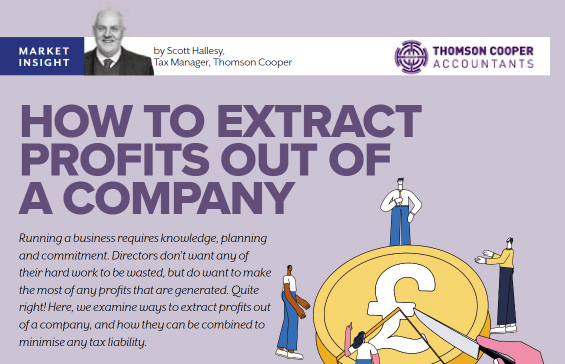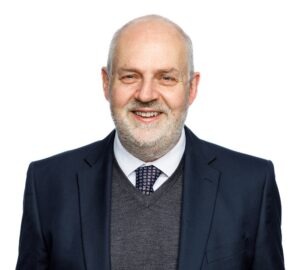Tax Manager Scott Hallesy examines ways to extract profits out of a company, and how they can be combined to minimise any tax liability.
How to extract profits out of a company
Running a business requires knowledge, planning and commitment. Directors don’t want any of their hard work to be wasted, but do want to make the most of any profits that are generated. Quite right! Here, we examine ways to extract profits out of a company, and how they can be combined to minimise any tax liability.
Four main ways to extract profits
Once you’ve set up a company and become a director, you have to be smart about how you extract profit to avoid paying more tax than you need to.
There are four main routes for a director to extract profits from their own limited company – salary, benefits in kind, dividends and pension contributions. Usually, combining these four methods is the most tax-efficient approach to minimise your tax bill.
With corporation tax applying on any of your company’s taxable profits from its accounting period, the money you take out of the profits to pay yourself can potentially reduce your company’s corporation tax liability.
Pay yourself a salary
When running a limited company, it might be easy to overlook that your business’s money doesn’t go straight into your personal bank account.
So, to get it into your pockets, firstly consider paying yourself a basic salary. This is usually set just below certain thresholds for National Insurance contributions (NICs) with the aim of enjoying the benefits of paying NIC without actually suffering any.
If, for example, you pay yourself above the lower-earning limit (£6,396 in 23/24 and 24/25), you will accrue qualifying years towards your state pension.
While that’s good news, paying yourself more than the Class 1 NICs secondary threshold (£9,100 for 23/24 and 24/25) may be less attractive.
Your company will become liable for employers’ NICs at a rate of 13.8% (for 23/24 and 24/25) on any earnings above that. If you pay yourself a penny less than £9,100, your company avoids paying this tax altogether.
The next payroll consideration is the personal allowance (£12,570 in 23/24 and 24/25). The basic rate of income tax doesn’t apply until you exceed this threshold.
One other point to remember is that any salary you pay yourself will be treated as a business expense, which means it will reduce your taxable profit and lower the amount of corporation tax your company has to pay.
Benefits in kind
Benefits in kind (BIK) are benefits that employees or directors receive from their company which aren’t included in their salary or wages. BIKs are subject to taxation and contribute to your overall income for tax purposes.
A company car or van and private health insurance are two common benefits which can be tax efficient and provide valuable ‘perks’ from the company. Historically, having a petrol or diesel car as a company car was commonplace but these days it is the electric company vehicle which is most tax efficient due to the low BIK values. The low BIK rate of 2% for 23/24 and 24/25 compares favourably with the highest BIK rate of 37% for much higher emission cars.
Taking dividends
Dividends are paid to the company’s shareholders out of post-corporation tax profits. Usually, a director will be one of those shareholders and could even be the sole shareholder.
Many directors pay themselves in a combination of salary and dividends. As dividends are drawn from profit, you need to show you have profit reserves available before paying dividends.
If you cannot demonstrate that, HMRC could reclassify your dividends as salary and you would almost certainly need to pay income tax and NICs on that.
Dividends are a different form of taxable income, and they are treated slightly differently in comparison to salary. The same income tax bands apply, but different dividend tax rates are associated with them.
The best way to illustrate how dividends are taxed is through an example. Let’s say you’re the sole shareholder, your company has made post-tax profits of £39,570, and your accounting period runs parallel to the tax year.
You take £8,000 as salary in 23/24 and £29,570 in dividends, £37,570 in total. The £1,000 tax free dividend allowance (reducing to £500 in 24/25) leaves £28,570 of your dividend potentially taxable, while what’s left (£36,570) will exceed the personal allowance (£12,570).
Once the personal allowance is deducted, £24,000 of your dividends will be taxable at 8.75%. You will fall into the basic-rate income tax band. This would leave you with a tax bill of £2,100, with the dividend being taxed as the top slice of income.
Dividends can often be an attractive way of remunerating spouses who own shares in the company but this is dependent on the company’s circumstances. It is important that all dividends are properly documented.
Pension contributions
The single most tax-efficient way to extract profits from your company, but often not the most practical, is to make employer contributions towards your pension.
These will reduce the company’s liability to corporation tax and they are not subject to NICs, although this does involve taking money out of the company for future use.
You can potentially put up to £60,000 gross into your pension pot over the course of the tax year with no tax due. If you haven’t used any of your annual pension allowance over the last three tax years, you might be able to carry over any unused annual allowance from those years.
The total amount you can save without incurring charges into your pension was previously capped at £1,073,100, due to what’s known as the ‘lifetime limit’ allowance, although this is set to be removed from April 2024.
Assuming you stay under these thresholds, when the time comes to take your pension benefits – currently after the age of 55 but rising to 57 from April 2028 – 25% is normally tax-free.
The rest of your retirement income that exceeds the personal allowance will be taxed at your marginal rate of income tax under the existing rules.
However you go about extracting profits from your company, getting tax planning advice on your own particular circumstances from a taxation specialist will help you pay the least amount of tax legally required. Please contact us at tax@thomsoncooper.com if you need help extracting profits from your company.
Scott Hallesy is a Tax Manager with over 30 years’ experience providing advice on all areas of direct taxation including corporate and personal tax planning, corporate restructuring and tax relief claims.


